外研版七年级下册M3U1重点单词短语句子
外研版七年级下册Module 1(重点词句语法+语法专项训练+基础知识巩固训练+培优提升训练)

Module 1语法专项练习(Module 1)一、单选题1.The wild animals are in danger now. Let's protect __________.A. theyB. themC. theirD. theirs2.I bought a present for ________. I hope you like ________.A. your; thisB. yours; thatC. you; itD. you; one3.—Mary, is that girl in a red skirt our new roommate? —Yes. Let's go and say hello to ____________.A. sheB. hersC. her4.After-school activities help students gain more skills and teach_______to care about others.A. meB. youC. them5.Put the ingredients in the bowl and ________ please.A. mix them upB. mix it upC. mix up themD. mix up it6.There are some vegetables on the plate. Could you ________?A. cut up itB. cut up themC. cut it upD. cut them up7.________ is always sad to say goodbye to someone you love.A. ItB. ThisC. ThatD. One8.—Judy, is that boy with glasses __________new classmate?—Yes. Let's say hello to ____________.A. we; heB. us; himselfC. ours; hisD. our; him9.—Do you like _______? —Yes, I like ______very much.A. apple; themB. apples; itC. apples; theseD. apples; them10.My father has two basketballs and three soccer balls. But he doesn't play_______.A. themB. usC. meD. her11.—Do Kate and Sally like ______? —Yes, _______do.A. carrot; weB. carrot; theyC. carrots; weD. carrots; they12.—I think Mom can help_______. —OK. Let's ask her for help.A.meB. themC. itD. us13. —Is this new bag ? —No, it’s .A. his; hisB. his; hersC. yours; myD. hers; your14. Can I use ________ pen? ________ isn't here.A. you; IB. your; MyC. yours; MineD. your; Mine15. —My sister can't find her eraser.—Is the one on Jack's desk ________?A. sheB. herC. she'sD. hers16. —Here’s a postcard for you, Jim!— Oh, ________ is from my friend, Mary.A. heB. itC. sheD. it’s17. Between you and ________, he is not a real friend.A. meB. IC. heD. his18. Jim’s book is new. What about ______?A. yourB. himC. herD. mine19. schoolbag is beautiful. But is more beautiful.A. Jims’; myB. Jim’s; mineC. Jim’s; meD. Jims’; I20. — Excuse me. Is the camera ?— Oh, yes. I am looking for everywhere. Thank you very much.A. you; itB. your; oneC. yours; itD. yours; one21. ________are in the same class. We are good friends.A. Her and meB. She and IC. Me and sheD. I and her22. —Pandas are ________ favourite animal.—What are ________?A. her; yoursB. your; herC. hers; yoursD. yours; hers23. —Is this ________schoolbag?—No, ________ is on the sofa.外研版七年级下册A. yours; mineB. yours; myC. your; mineD. your; my24. These are my books. Where are ?A. theirB. theirsC. myD. your25. Miss Yang is English teacher. This dress is .A. we; sheB. we; herC. our; herD. our; hers二、语法填空1.After a busy morning at work, lunchtime gives ___________(I)a chance to do many things, such as exercise, read and watch TV.2.Miss Li teaches ___________ (they) English.3.Please call___________ (he) back after school.4.He plays volleyball with___________ (we) after school.5.Let's watch___________ (they) on TV.6.This is Miss Wang, she teaches ___________(we) English.7.Is that car yours? Yes, it is ___________. (I)8.Mike's hobby is playing basketball. ___________ is listening to the music. (I)9.That black and white dog is ___________ (my).10. Mr Yang is __________(we) teacher.___________(him) is from Beijing. __________(his) teaches_________(our) English.11. Look,there is a cat.__________(they) is Lily's._______(it) name is Mimi.12. Let_________(I) tell _________(she) about________(he) life at school.13. This is _________(they) room.Where is ________(our)?14. Don't use the eraser._________ is _________(me).15. The lady under the tree is ____________(me) aunt.___________(her) often sings with ___________(she) husband.基础知识巩固练习(Module 1)一、单选题( )1. schoolbag is new. But is old.A. My; Jim’sB. Mine; Jim’sC. Me; Jim’sD. I; Jim’s( ) 2. _______ mother usually cooks for ________ at the weekend.A. Lily and Nick; theirB. Lily’s and Nick’s; themC. Lily and Nick’s; theirD. Lily and Nick’s; them ( )3. Look, these are ___________bicycles. They are modern and cool.A. Jim and Tom’sB. Jim’s and TomC. Jim’s and Tom’sD. Jim and Tom( )4. —Is this maths book Betty's?—Yes, it's ________. Here is ________ name.A. her; herB. him; hisC. hers; herD. hers; hers( )5. —_______ is this pen?—It’s mine.A. WhatB. WhoseC. WhereD. How( )6. —gloves are these?—Sorry. I don’t know.A. WhoB. WhomC. WhoseD. Who’s( )7. Here ________ my gloves. Would you like to try them on?A. isB. haveC. areD. has( )8. —Do you eat ________ vegetables every day?—Yes, I like them ________.A. a lot; a lot ofB. a lot of; a lotC. a lot of; a lot ofD. a lot; a lot( )9. There are ________ of students in our school, but only ________ of them live in the school.A. hundreds; two hundredsB. hundred; two hundredsC. hundreds; two hundredD. hundred; two hundred( )10. A man is talking to a woman________ the lost and found office.A. toB. inC. atD. on( )11. This is ______ key and that is ______ eraser.A. a; aB. a; anC. an; aD. an; an( )12. Hurry up, _________ you will be late for class.A. andB. orC. butD. so( )13. Boys and girls, please welcome Tony ________ our class.A. toB. atC. inD. of( )14. —May I use your ________? I want to take some photos of the flowers. —Sure. Here you are.A. crayonB. computerC. watchD. camera( )15. —What are you doing?—I’m my mobile phone. I can’t it.A. finding; findB. looking; findC. looking for; findD. looking for; look for( )16. Do you have__________ to tell me?A. anything newB. something newC. something newD. new something( )17.—__________. Are these your orange gloves? —No. I don’t know _______ it is.A. Excuse me; whoB. Excuse me; whoseC. Sorry; whoD. Sorry; whose( )18. There is ________ basketball here. Do you like playing _________ baseball?A. a; aB. a; /C. the; theD. a; the( )19. Please be careful my iPhone X! It’s too expensive.A. byB. onC. atD. with( )20. There are vegetables, fruit, meat and many ________things in the supermarket.A. otherB. the othersC. anotherD. others( ) 21. Simon is ________his lost dog. Can you help him________ it?A. looking for; findB. finding; look forC. look for; findD. find; look for ( ) 22. It's very cool in Harbin in summer, so ________ people come here for vacation.A. thousands ofB. thousand ofC. two thousandsD. two thousand of ( ) 23. May I use your dictionary, Mary? I always ________mine at home.A. leaveB. chooseC. saveD. forget( ) 24. Water is very dangerous sometimes. So we must be careful _____ it.A. ofB. withC. toD. in( ) 25. We couldn't buy anything because ________of the shops were open.A. allB. bothC. nothingD. none( )26. The boy lost his favourite dog. That's ________ he looks sad.A. whatB. whyC. becauseD. how( )27. I have a new ______ . I can put my money in it.A. gloveB. walletC. eraserD. camera( )28. —It is raining . —Don’ t ______ until(直到) the rain stops.A. runB. stayC. comeD. leave( )29. Mr. Wang often ________ his dictionary in the library.A. leavesB. forgetsC. takesD. brings( )30. It’s not nec essary to find a friend who is the same you.A. inB. asC. toD. from( )31. Bill likes playing________basketball,but he doesn’t like playing________piano.A. the,theB. /,theC. the,/D. /, /( )32. __________ two boys are Mr Green's sons.A. ThisB. TheseC. ThatD. They( )33. __________ is Mr White and __________ is my father.A. This;thoseB. That;theseC. These;theseD. This;this ( )34. Look! is my green and blue sports bag and I like very much.A. This; itB. It; thisC. It; thatD. This; that ( )35. My mum can English very well. Now she’ s a story to my little brother.A. talk; sayingB. speak; tellingC. tell; talkingD. say; speaking ( )36. Tom his camera everywhere, but he can’t it.A. looks for; findB. looks for; look forC. finds; findD. finds; look for ( )37. —This is my lost watch. Thank you very much.—________.A. Don't say soB. The same to youC. Don't thank meD. You're welcome ( )38. — Here is a purple wallet. Is it yours?— Yes, it is. .A. That’s OKB. You’re welcomeC. Thank youD. That’s all right二、根据首字母、句意及汉语提示写出所缺的单词1. Be __________(小心的)not to be late for school again.2. __________(谁的)blouse is this? Is it yours?3. Look at your __________(手表), please. What’s the time now?4. This is Betty. The beautiful bike is __________(她的).5. Tony takes some photos with a new __________(相机).6. __________(数以千计的)of people come to visit Mount Tai every day.7. I lost my __________(钱包), so I don’t hav e any money now.8. Mother wants to buy a pair of __________(手套)for my birthday.9. How many __________(橡皮擦)have you got, Daming?10. The bookshop is next to the bus station. You can __________(找到)it easily.11. Be __________(小心), and don’t give the tiger any food.12. The story is very __________(奇怪的). I can’t believe it.13. Students often use __________(蜡笔)to draw pictures in art class.14. — Where are you going?— To the __________(机场). I want to take a plane to Shanghai.15. Tom doesn’t like the __________(香肠).16. It’s very __________ (奇怪). I don’t know it.17. It’s very far from our hotel to the station, you’d better take a __________ (出租车).18. Mr. Green _____________ (忘了带) his umbrella on the bus.19. We found three _____________ (鸭子) at the Lost and Found Office.三、用所给单词的正确形式填空1. These are my ____________ (eraser).2. Can you ____________ (find) the old map of the city?3. It's easy ____________ (lose) things when travelling.4. Is that blue bag ____________ (you)?5. There are different kinds of____________ (wallet) in the shop.6. These ____________(be not) his pens. ____________ (he) are black.7. My new book is in the ____________(lose) and ____________(find) box.8. Look!Here is a pair of ____________ (glove).9. There ____________ (be) a pair of gloves on the desk.10. —What are you ____________ (look) for?—I'm looking for my eraser.11. ____________ (thousand) of people visit the Great Wall every day.12. I want to buy five ____________ (kilo) of apples.13. Tom often ____________ (leave) his homework at home when he goes to school in a hurry.四、句型转换1. That's Daming's bag. (对画线部分提问)________ ________ ________ that?2. The young people on the bus come from Australia. (改为一般疑问句)________ the young people on the bus ________ ________ Australia?3. I think the watch is Lisa's. (改为否定句)I ________ ________ the watch __________ Lisa's.4. Some flowers are here for our teachers. (改为同义句)__________ __________ some flowers for our teachers.5. These are your gloves. (改为同义句)These __________ are__________.6. There is a picture book in Ben’s bag.(改为同义句)Ben ______ a picture book in _______ bag.7. There are some oranges and eggs on the table. (改为单数形式)________ ______ ______ orange and _______ egg on the table.8. Tom always runs into the classroom hurriedly.(改为同义句)Tom always runs into the classroom __________ __________ __________.9. Are these your ducks?(作肯定回答)__________, ___________________.10. We go to Yantai by boat.(对画线部分提问)__________ __________ you go to Yantai?11. I buy fifteen kilos of beef.(对画线部分提问)__________ __________ __________ of beef do you buy?12. We are looking for our cameras, too.(改为同义句)We are __________ __________ for our cameras.培优提高训练(Module 1)一、完型填空Bags of LoveLast year, I worked in a middle school near my mother's house, and I stayed with her for a month. During that time, I helped her do some housework and buy some1.After the first week, I noticed that the food was2very quickly. Then I began keeping an eye on my mum. To my surprise, I found that she would put some of the food into a paper3and go out with it at about nine every morning. And finally, I decided to follow her. I saw her taking the food to the street children. She would also4 a lot of time talking and playing with them.One day, I talked to a neighbor and found out that my mum was well-known in the area. The children were very friendly with her and even thought of her as their own5. Then it hit me — why wouldn't she want to tell me about it? Was she worried that I would stop buying food6I found it out?When my mum got home, I gave her a big hug. I told her she didn't need to keep it a7from me. And she told me something about the children. Some of them lived with an old lady in a small house. Others8on the street. For years, she was helping the poor street children by giving them food. After she told me everything, I was so moved by how selfless(无私的)she was. She helped others in need. As her son, I was so9of my mum.I10to buy food for my mum after that. But I always added one more bag for her other children.1.A. drinks B. clothes C. food D. fruit2.A. cleared out B. sold out C. thrown away D. eaten up3.A. bag B. box C. case D. basket4.A. take B. pay C. cost D. spend5.A. mother B. teacher C. sister D. friend6.A. although B. unless C. if D. before7.A. secret B. day C. joke D. present8.A. played B. ran C. cried D. slept9.A. surprised B. tired C. afraid D. proud10.A. stopped B. refused C. continued D. hated二、阅读理解AWhen talking about picking a right school, a mother and teacher gave some pieces of advice.In the latest issue (期) of Youth magazine, the mother shared the school advice she gave her daughters with young people across the country."I've told my daughters many times that I don't want them to choose a name," the mother said. "I don't want them to think, ‘Oh, I should go to these top schools.' We live in a country with hundreds of excellent universities. So the first question is: what's going to work for me?""When it was time to prepare for picking schools, nobody around me believed I could get into Xiamen University. But through hard work I finally made it," she continued. "So, my second piece of advice is: believe in yourself, no matter what other people might say. Once your goal is set, you only need to try your best to make it come true.""The last piece of advice is not to be worried even if your dreams don't come true. As I've said above, there are so many good universities out there. So it's important for everybody to understand that you can always find a university that gives you a great education."1.The mother shared her advice .A. with her studentsB. with her husbandC. in Youth magazineD. in Xiamen University2.To explain her second piece of advice, the mother gave .A. a story of her daughtersB. a story of her ownC. some different reasonsD. some different ideas3.We can learn from the last paragraph that .A. we can realize our dream through hard workB. the name of the university isn't the most importantC. it's not necessary to care what other people might sayD. more than one university can give us a good education4.The best title of the passage may be "".A. Colorful University LifeB. Best School EducationC. A Report on University BuildingD. Advice on School PickingBMr. Guo is a teacher from Xi'an. He asked his students to hand in their homework through the QR code(二维码). "We spent an hour or two in class learning how to generate(产生)the codes, and in the end everything gets easier," said Guo. "When students finish the homework, they keep it on WeChat. Then, each student makes his own QR code and gives it to me. So I can check their work anywhere using my computer or telephone."The QR codes can be sent to Mr. Guo by email, QQ and WeChat. When Guo scans(扫描) his students' QR codes, their homework appears on his phone. He finds that their homework becomes more creative, with many pictures, music and even videos.Guo's students like the new way and think it is interesting. "We are living in the information age. Many students like to work with computers, which makes learning more fun," said Tingting, a student of Guo's."The paper is not easy to keep, but the code is easy to keep and share," Guo said. "It is worth trying to use new technology in education. Education itself is a kind of creation. I don't want my students to fall behind the times."However, some parents are worried. They are afraid that their children will spend too much time on computers and less time communicating with teachers. But in fact, it's unnecessary. Students still need to look up information in books and write it down when they do their homework. They only use the code when they hand in their work, which doesn't take them too much time. Also for teachers, it allows them to check the students' work at any time. And it's also an easy way to share homework with other students.1.According to the passage, students can keep their homework on .A. WeChatB. QQC. emailD. blog2.Guo's students think the new way is .A. strangeB. boringC. interestingD. unnecessary3.What does "It" in Paragraph 4 refer to(指代)?A. The paper is not easy to keep.B. Keeping and sharing the code easily.C. Trying to use new technology in education.D. Education itself is a kind of creation.4.Some parents are worried, because they think their children will .A. talk with teachers face to faceB. spend too much time on computersC. not like the new way of handing in homeworkD. find the QR codes too difficult to useCWhat will the life be like in the future? Maybe no one knows because we never know what will happen in the future. But it's very interesting to make some predictions. Here are some exciting predictions.LanguagesEnglish should still be the most popular language, but Chinese should be the second. Now, many foreign people are studying Chinese as their second language. In the future, many other languages will disappear.WaterWater will become as expensive as oil because many rivers will disappear. We will have to save water and pay more for clean water.Education and ScienceStudents won't go to school. They will stay at home and study online. Students from all over the world may study together on the Internet. We may eat more genetically modified (转基因) food. And more robots will be around us. Lots of dangerous work will be done by them.TravelMore people will travel in their own country. Travelling in different countries will be more expensive and will take more time. Travelling by bus, by ship or by train may become very popular. Of course, flying may be the most popular.LivingPeople will live and work under the sea. Perhaps there will be big towns, factories and farms under the sea, too. Everyone will carry a pocket computer. The computer will give people all the answers to all their questions.1. What are many people learning as their second language now?A.Chinese.B.English.C.Japanese.D.French.2. Why will water become expensive according to the passage?A.Because more people will need water.B.Because there will be more water pollution.C.Because many rivers will disappear.D.Because oil will be cheaper.3. Travelling _____ will be the most popular.A.by busB.by shipC.by trainD.by plane4. Which is TRUE according to the passage?A.Chinese will be the most popular language.B.We have to save oil and pay more for oil.C.People don't like genetically modified food at all.D.Students can stay at home and study on the Internet.5. The main idea of the passage is about _____.A.the school lifeB.the life in the futurecation and scienceD.the most popular languageDEvery morning my father buys a newspaper on his way to work. Every evening my mother looks through magazines at home. And every night, I look at the posters with photos of David Beckham and Yao Ming on my bedroom wall before I go to sleep. Can we imagine life without paper or print?Paper was first created about 2,000 years ago, and has been made from silk, cotton, bamboo, and, since the 19th century, from wood. People learned to write words on paper to make a book. But in those days, books could only be produced one at a time by hand. As a result, they were expensive and rare. And because there weren’t many books, few people learned to read.Then printing was invented in China. When printing was developed greatly at the beginning of the 11th century, books could be produced more quickly and cheaply. As a result, more people learned to read. After that, knowledge and ideas spread quickly.Today information can be received online, downloaded from the Internet rather than found in books, and information can be kept on CD-ROMs or machines such as MP3 players.Computers are already used in classrooms, and newspapers and magazines can already be read online. So will books be replaced by computers one day? No, I don’t think the Yao Ming p oster on my bedroom wall will ever be replaced by a computer two metres high!1.What does the writer do before he goes to sleep’?A. He reads books.B. He reads newspapersC. He looks through magazinesD. He looks at the posters on the wall.2.When was paper first created?A. About 2.000 years ago.B. In the 19th century.C. About 1.000 years ago.D. In the 11th century.3.Why were books expensive and rare before the invention of printing?A. People could not read.B. People could not write words on paper.外研版七年级下册C. People could not find silk, cotton or bamboo. D People could only produce books one at a time by hand4.What happened after books became cheaper?A. People didn’t want to buy books.B. Printing was invented in China.C. Knowledge and ideas spread quickly.D. The Internet was introduced to people soon5.What is the writer’s opinion about books and computers’?A. People won’t need books any moreB. Books won’t be replaced by computers.C. People prefer to find information in books.D. Computers have already replaced books.三、词汇运用A)根据括号中所给单词的中文意思完成短文。
七年级英语下册 module 1 短语素材 外研版
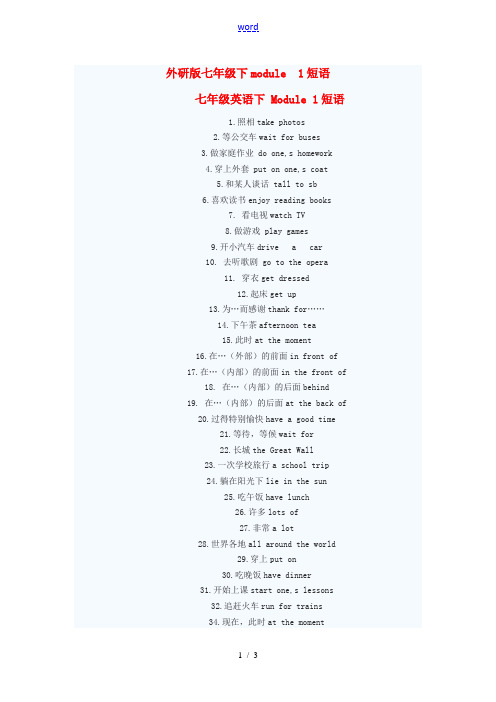
外研版七年级下module 1短语七年级英语下 Module 1短语1.照相take photos2.等公交车wait for buses3.做家庭作业 do one,s homework4.穿上外套 put on one,s coat5.和某人谈话 tall to sb6.喜欢读书enjoy reading books7. 看电视watch TV8.做游戏 play games9.开小汽车drive a car10. 去听歌剧 go to the opera11. 穿衣get dressed12.起床get up13.为…而感谢thank for……14.下午茶afternoon tea15.此时at the moment16.在…(外部)的前面in front of17.在…(内部)的前面in the front of18. 在…(内部)的后面behind19. 在…(内部)的后面at the back of20.过得特别愉快have a good time21.等待,等候wait for22.长城the Great Wall23.一次学校旅行a school trip24.躺在阳光下lie in the sun25.吃午饭have lunch26.许多lots of27.非常a lot28.世界各地all around the world29.穿上put on30.吃晚饭have dinner31.开始上课start one,s lessons32.追赶火车run for trains34.现在,此时at the moment35.喝下午茶have afternoon tea36.在饭馆in the restaurant37.开公共汽车drive buses38.在小酒馆喝杯酒have a drink in a pub39.拜访朋友visit a friend40.写X明信片write a postcard41.呆在家里stay at home42在家at home43.在工作at work44.呆在床上stay in bed45.购买shop for46.给某人打call sb.47喜欢做某事enjoy doing sth.48给某人穿衣服dress sb.49.下班leave work50.看一看。
[荐]外研版英语七年级下M3U1、2、3重点句子集锦-全考点
![[荐]外研版英语七年级下M3U1、2、3重点句子集锦-全考点](https://img.taocdn.com/s3/m/57bcde3626fff705cd170a80.png)
外研版英语七年级下M3U1、2、3重点句子集锦-全考点外研版新标准英语七下M3U1的主要内容是在掌握一些有关周末活动的短语的基础上,通过讨论周末的计划、安排,学习用be going to 句型表达自己的打算或计划要做的事情。
重点句子1.What are you going to do at the weekend,Daming? 大明,你周末打算在做什么?at the weekend/at weekends 在周末2.On Saturday morning, I'm going to check my email and do my homework. 在周六上午,我打算检查邮件,做作业。
(1)on Saturday morning=on the morning of Saturday 在周六上午(2)check email 检查邮件(3)do homework 做作业3.Then I'm going to help with the housework.然后我打算帮助做家务。
help with the housework=help do/to do housework 做家务4.I'm going to see a movie in the afternoon.我打算下午看电影。
(1)see a movie=see a film=watch a film/movie 看电影(2)in the afternoon 在下午5.Who else is going to be there? 还有谁会去那?else 其他;另外,可以放在特殊疑问词或(不定)代词、副词后。
What else are they going to do?/I want to go somewhere else.6.Lingling is going to have a piano lesson, so she can't come with us, but on Sunday afternoon, Lingling and I are going to have a picnic. Lingling 打算上钢琴课,所以她不能和我们一起来,但是在周日下午,玲玲和我打算吃野餐。
外研版初中英语七下Module 1 自学(知识点)
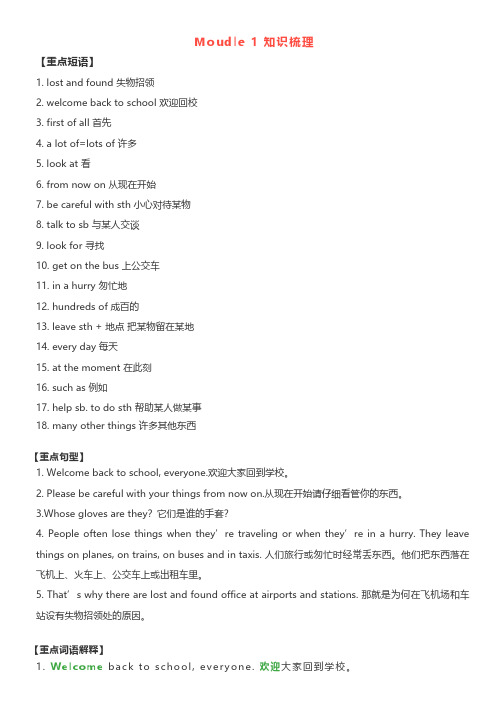
品。
主人
物品
大明
足球、手表
玲玲
钱包、橡皮擦
我
手套、相机
范文:
Now we are at the lost and found office.We are very happy because we find our lost things here. The football is Daming's. The watch is his , too.The wallet is Lingling's. The eraser is also hers. Oh! Look! My gloves are here. The camera is mine , too. I think we should be careful with our things from now on .
【重点句型】 1. Welcome back to school, everyone.欢迎大家回到学校。 2. Please be careful with your things from now on.从现在开始请仔细看管你的东西。 3.Whose gloves are they?它们是谁的手套? 4. People often lose things when they’re traveling or when they’re in a hurry. They leave things on planes, on trains, on buses and in taxis. 人们旅行或匆忙时经常丢东西。他们把东西落在 飞机上、火车上、公交车上或出租车里。 5. That’s why there are lost and found office at airports and stations. 那就是为何在飞机场和车 站设有失物招领处的原因。
外研版七年级下Module 1 短语与知识点总结

Module 1 短语与知识点总结1、lost and found 失物招领in the lost and found box 在失物招领箱at the lost and found office 在失物招领处2、welcome back to 欢迎回到. welcome to +表示地点的名词欢迎来某地welcome home 欢迎回家3、first of all 首先4、there be 句型中谓语动词采用就近原则5、a lot of =lots of 许多既可以修饰可数名词复数,也可以修饰不可数名词。
6、look at 看,后面加名词(不一定看见)look 不及物动词,后面不直接加名词see 看见,看到; 看望;理解,明白watch 观看,仔细地看(比赛、电视等)read 看(书、报纸、杂志等)7、everyone/everybody 做主语,谓语动词用单数8、be careful with 注意.../小心...9、from now on 从现在开始from then on 从那时开始10、talk to sb 和某人说话(侧重主动说)talk with sb 和某人说话(侧重两人都说)talk about sth 谈论某事say 说,强调说的内容say to sb sth 和某人说某事speak 说,后面可以直接接语言speak to sb 和某人说话(只强调动作)tell sb sth=tell sth to sb告诉某人某事tell a story 讲故事11、look for 寻找(不一定找到)find (偶然地)找到find out 查明,找到(经过努力)search +地点/人搜索,调查search for +sth 搜索,调查某物12、forget sth 忘记某物leave sth +地点把某物落在某地13、in a hurry 匆忙地hurry up=come on 快点儿hurry to do sth 匆忙做某事14、hundreds of 成百的(大约数加s,加of)two hundred (具体数不加s,不加of)同样用法还有thousand、million、billion15、every day 每天everyday 每天的(形容词,后面接名词)16、at the moment=at this moment=now 此时此刻,现在at that moment=then 在那时17、such as 例如,后面不加逗号for example 例如,后面加逗号18、帮助某人做某事help sb (to)do sth help sb with sth19、lose sth 丢失某物sth be lost 某物丢失了sb be lost 某人丢失了/迷路了20、Here is/are +sth 这里是……Here is /are sth for sb 这里有给某人的……东西21、call sb 给某人打电话call+电话号码打……号码call home 打电话回家call sb at +电话号码给某人打……电话号码be called被叫作 a girl called Lingling . 叫玲玲的女孩call him Uncle Wang 叫他王叔叔22、--whose ... is this/are these?这是谁的...?--It’s/They are+名词性物主代词.23、Is this/Are these ...+名词性物主代词?这个/些...是某人的吗?情态动词:词意不完整,不能单独做谓语,必须和实意动词,连系动词的原形一起构成谓语,表示说话人对某种动词和状态的看法。
外研社七年级下册Module 1-Module 3基础短语清单
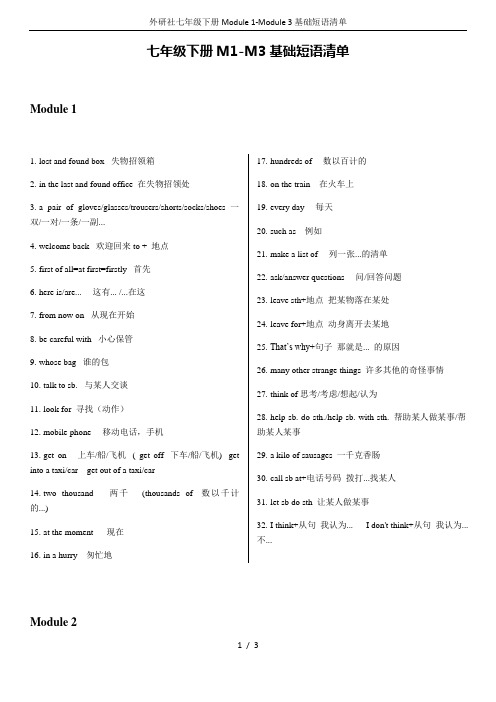
外研社七年级下册Module 1-Module 3基础短语清单七年级下册M1-M3基础短语清单Module 11.lost and found box 失物招领箱2.in the last and found office 在失物招领处3.a pair of gloves/glasses/trousers/shorts/socks/shoes 一双/一对/一条/一副...4.welcome back 欢迎回来 to + 地点5.first of all=at first=firstly 首先6.here is/are... 这有... /...在这7.from now on 从现在开始8.be careful with 小心保管9.whose bag 谁的包10.talk to sb. 与某人交谈11.look for 寻找(动作)12.mobile phone 移动电话,手机13.get on 上车/船/飞机 ( get off 下车/船/飞机) get into a taxi/car get out of a taxi/car14.two thousand 两千(thousands of 数以千计的...)15.at the moment 现在16.in a hurry 匆忙地17.hundreds of 数以百计的18.on the train 在火车上19.every day 每天20.such as 例如21.make a list of 列一张...的清单22.ask/answer questions 问/回答问题23.leave sth+地点把某物落在某处24.leave for+地点动身离开去某地25.That’s why+句子那就是... 的原因26.many other strange things 许多其他的奇怪事情27.think of思考/考虑/想起/认为28.help sb. do sth./help sb. with sth. 帮助某人做某事/帮助某人某事29.a kilo of sausages 一千克香肠30.call sb at+电话号码拨打...找某人31.let sb do sth 让某人做某事32.I think+从句我认为... I don't think+从句我认为...不...Module 21.play table tennis 打乒乓球2.play the piano 弹钢琴3.play tennis 打网球4.ride a bike 骑自行车5.speak Chinese 说汉语6.would like to do sth. 想要做某事7.join Music Club 加入音乐俱乐部8.that's all 仅此而已9.dance very well 跳舞跳得非常好10.worry about=be worried about 担心11.the start/beginning of the new term 新学期的开始12.get on well with sb. 与某人相处融洽13.work hard 努力工作14.be good at = do well in 擅长做某事15.be kind to sb. 对某人友好16.be ready to do sth. 准备做某事17.promise to do sth. 承诺做某事18.want to be 想要成为...19.choose...as... 选...当...20.enjoy doing sth. 享受做某事21.run fast 跑得快22.keep fit and healthy 保持健康23.between lessons 课间24.get the best score 获得最好的分数25.do cleaning 打扫卫生26.a clean and tidy house 一个干净整洁的教室27.just like 正如/正像28.make our classroom beautiful 让我们的教室变漂亮29.in the school team 在校队30.be sure+从句确信的31.fly a kite 放风筝32.swim well 游泳游的好33.make a poster 制作海报34.on the board 在布告板Module 31.go over 复习2.check email 查看电子邮件3.have a picnic 去野餐4.at the weekend 在周末5.see a movie 看电影6.疑问词/不定代词+else 其他...7.nobody=no one 没有人8.help with the housework 帮忙做家务9.have a piano lesson 上钢琴课10.on Saturday morning 在周六上午11.join us 加入到我们中来12.stay at home alone 独自待在家里e with us 和我们一起14.a fantastic weekend 一个极好的周末15.Don't be silly!别傻了16.look forward to 盼望17.get up late 晚起18.meet other fans 见到其它球迷19.make friends with sb. 与...交朋友20.cheer the players 为运动员们喝彩21.win the match 赢得比赛22.enjoy oneself=have fun=have a good time 过得愉快/玩的开心23.during the May Day(Labor Day) holiday 在五一劳动节假期期间24.take a walk=go for a walk 散步25.collect litter in the park 在公园里收集垃圾26.on 2nd May 在五月二日27.go on summer camp 去夏令营28.stay with sb. 与某人待在一起29.go sightseeing 观光30.on the beach 在海滩上31.travel around the world 环游世界32.make plans 制定计划33.stay in bed 待在床上34.do some sports 做运动35.go shopping=do some shopping 去购物36.It’s time to do sth.= It’s time for sth. 该到(做)某事的时间了。
外研版七年级下册M3U1学习讲义 课文翻译 重点短语句子,语法讲解
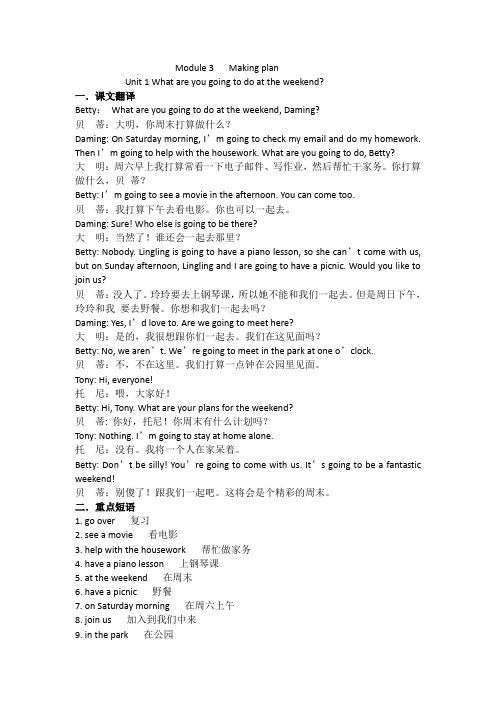
Module 3 Making planUnit 1 What are you going to do at the weekend?一.课文翻译Betty:What are you going to do at the weekend, Daming?贝蒂:大明,你周末打算做什么?Daming: On Saturday morning, I’m going to check my email and do my homework. Then I’m going to help with the housework. What are you going to do, Betty?大明:周六早上我打算常看一下电子邮件、写作业,然后帮忙干家务。
你打算做什么,贝蒂?Betty: I’m going to see a movie in the afternoon. You can come too.贝蒂:我打算下午去看电影。
你也可以一起去。
Daming: Sure! Who else is going to be there?大明:当然了!谁还会一起去那里?Betty: Nobody. Lingling is going to have a piano lesson, so she can’t come with us, but on Sunday afternoon, Lingling and I are going to have a picnic. Would you like to join us?贝蒂:没人了。
玲玲要去上钢琴课,所以她不能和我们一起去。
但是周日下午,玲玲和我要去野餐。
你想和我们一起去吗?Daming: Yes, I’d love to. Are we going to meet here?大明:是的,我很想跟你们一起去。
我们在这见面吗?Betty: No, we aren’t. We’re going to meet in the park at one o’clock.贝蒂:不,不在这里。
外研版七年级下册M3U1重点单词短语句子
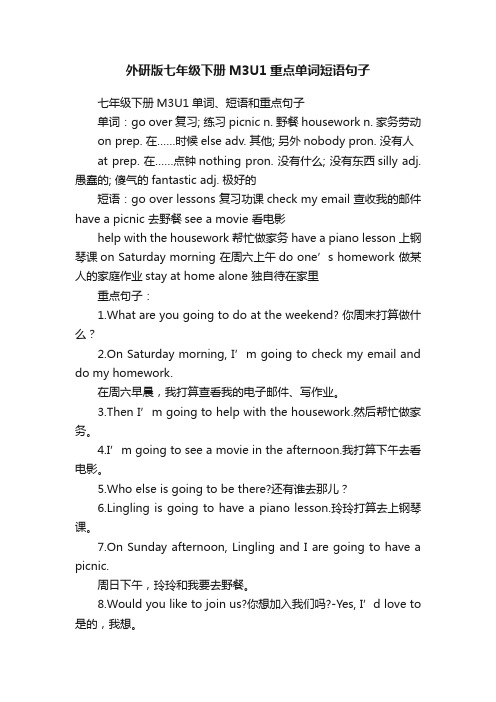
外研版七年级下册M3U1重点单词短语句子七年级下册M3U1单词、短语和重点句子单词:go over复习; 练习picnic n. 野餐housework n. 家务劳动on prep. 在……时候else adv. 其他; 另外nobody pron. 没有人at prep. 在……点钟nothing pron. 没有什么; 没有东西silly adj. 愚蠢的; 傻气的fantastic adj. 极好的短语:go over lessons 复习功课check my email 查收我的邮件have a picnic 去野餐see a movie 看电影help with the housework 帮忙做家务have a piano lesson 上钢琴课on Saturday morning 在周六上午do one’s homework 做某人的家庭作业stay at home alone 独自待在家里重点句子:1.What are you going to do at the weekend? 你周末打算做什么?2.On Saturday morning, I’m going to check my email and do my homework.在周六早晨,我打算查看我的电子邮件、写作业。
3.Then I’m going to help with the housework.然后帮忙做家务。
4.I’m going to see a movie in the afternoon.我打算下午去看电影。
5.Who else is going to be there?还有谁去那儿?6.Lingling is going to have a piano lesson.玲玲打算去上钢琴课。
7.On Sunday afternoon, Lingling and I are going to have a picnic.周日下午,玲玲和我要去野餐。
外研版七年级英语下册第一模块短语和重点句型教学提纲
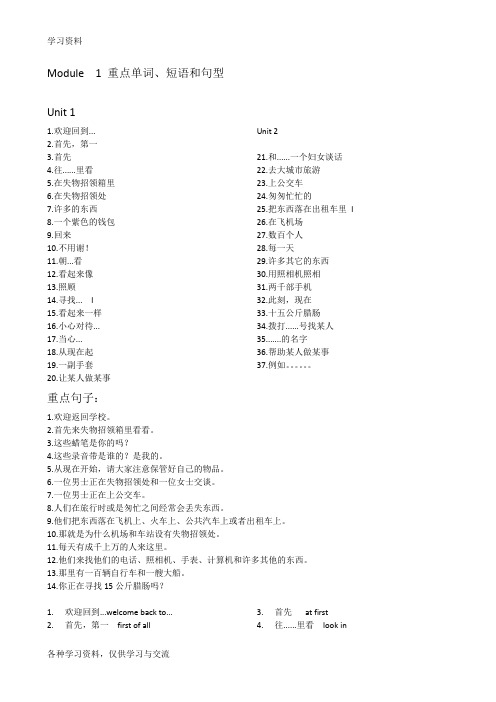
Module 1 重点单词、短语和句型Unit 11.欢迎回到...2.首先,第一3.首先4.往......里看5.在失物招领箱里6.在失物招领处7.许多的东西8.一个紫色的钱包9.回来10.不用谢!11.朝...看12.看起来像13.照顾14.寻找... l15.看起来一样16.小心对待...17.当心...18.从现在起19.一副手套20.让某人做某事Unit 221.和......一个妇女谈话22.去大城市旅游23.上公交车24.匆匆忙忙的25.把东西落在出租车里l26.在飞机场27.数百个人28.每一天29.许多其它的东西30.用照相机照相31.两千部手机32.此刻,现在33.十五公斤腊肠34.拨打......号找某人35.......的名字36.帮助某人做某事37.例如。
重点句子:1.欢迎返回学校。
2.首先来失物招领箱里看看。
3.这些蜡笔是你的吗?4.这些录音带是谁的?是我的。
5.从现在开始,请大家注意保管好自己的物品。
6.一位男士正在失物招领处和一位女士交谈。
7.一位男士正在上公交车。
8.人们在旅行时或是匆忙之间经常会丢失东西。
9.他们把东西落在飞机上、火车上、公共汽车上或者出租车上。
10.那就是为什么机场和车站设有失物招领处。
11.每天有成千上万的人来这里。
12.他们来找他们的电话、照相机、手表、计算机和许多其他的东西。
13.那里有一百辆自行车和一艘大船。
14.你正在寻找15公斤腊肠吗?1.欢迎回到...welcome back to...2.首先,第一first of all3.首先at first4.往......里看look in5.在失物招领箱里in the lost and found box6.在失物招领处at / in the lost and found office7.许多的东西 a lot of things8.一个紫色的钱包a purple wallet9.回来come back10.不用谢!You’re welcome!11.朝...看look at12.看起来像look like13.照顾look after14.寻找... look for15.看起来一样look the same16.小心对待... be careful with...17.当心... be careful of18.从现在起from now on19.一副手套a pair of gloves20.让某人做某事let sb do sthUnit 221.和......一个妇女谈话talk to a woman 22.去大城市旅游travel to a big city23.上公交车get on the bus24.匆匆忙忙的in a hurry25.把东西落在出租车里leave things in taxis26.在飞机场at the airports27.数百个人hundreds of people28.每一天every day29.许多其它的东西many other things30.用照相机照相take photos with the camera31.两千部手机two thousand mobile phones32.此刻,现在at the moment33.十五公斤腊肠15 kilos of sausages34.拨打......号找某人call sb at...35.......的名字the name of...36.帮助某人做某事help sb with sth=help sb (to ) do sth37.例如......such asModule 1 单词表1._________ 蜡笔2._________ 橡皮擦3.__________ 手套4._________ 钱包5.________ 表; (通常指)手表6.__________ 谁的7.____________ 首先; 第一8.____________ 失去9.____________ 发现; 找到10.____________ 失物招领箱11.____________ 我的12.____________ 你(们)的13.____________ 录音带;录像带14.________ 紫色的; 紫红色的/紫色;紫红色15.________ 她的16._______ 仔细的; 认真的; 小心的17._______ 从某时刻起18._______ 从现在开始19._____ (用于刚找到某人或某物时) 在这儿20._________ 照相机21._________ 电话; 电话机22._________ 移动电话; 手机23.__________失物招领处24.____________ 匆匆忙忙25.____________ 丢下; 遗忘26.____________ 飞机27.____________ 出租车28.____________ 为什么29.____________ 机场;航空港30.____________ 百31.____________ 几百; 成百上千32.____________ 寻找33.____________ 千34.____________ 奇怪的35.____________ 船36.____________ 鸭37.____________ 猪38.____________ 香肠;腊肠学习资料。
外研社七年级英语下册 MODULE 1 重要短语归纳整理
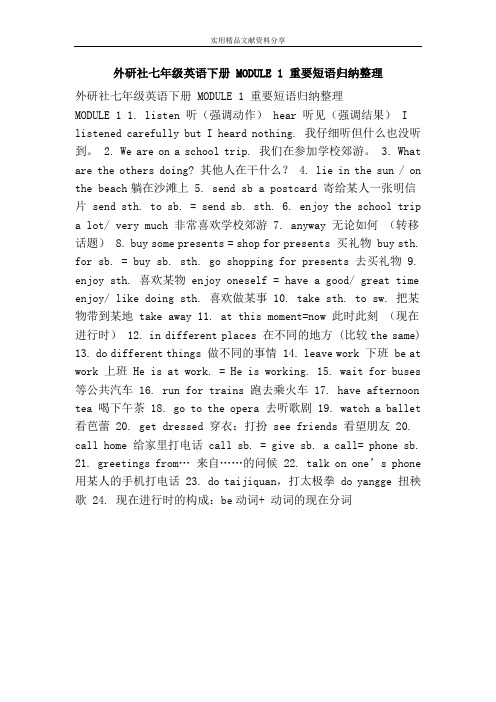
实用精品文献资料分享外研社七年级英语下册 MODULE 1 重要短语归纳整理外研社七年级英语下册 MODULE 1 重要短语归纳整理MODULE 1 1. listen 听(强调动作) hear 听见(强调结果) I listened carefully but I heard nothing. 我仔细听但什么也没听到。
2. We are on a school trip. 我们在参加学校郊游。
3. What are the others doing? 其他人在干什么? 4. lie in the sun / on the beach躺在沙滩上 5. send sb a postcard 寄给某人一张明信片 send sth. to sb. = send sb. sth. 6. enjoy the school trip a lot/ very much 非常喜欢学校郊游 7. anyway 无论如何(转移话题) 8. buy some presents = shop for presents 买礼物 buy sth. for sb. = buy sb. sth. go shopping for presents 去买礼物 9. enjoy sth. 喜欢某物 enjoy oneself = have a good/ great time enjoy/ like doing sth. 喜欢做某事 10. take sth. to sw. 把某物带到某地 take away 11. at this moment=now 此时此刻(现在进行时) 12. in different places 在不同的地方 (比较the same) 13. do different things 做不同的事情 14. leave work 下班 be at work 上班 He is at work. = He is working. 15. wait for buses 等公共汽车 16. run for trains 跑去乘火车 17. have afternoon tea 喝下午茶 18. go to the opera 去听歌剧 19. watch a ballet 看芭蕾 20. get dressed 穿衣;打扮 see friends 看望朋友 20. call home 给家里打电话 call sb. = give sb. a call= phone sb.21. greetings from… 来自……的问候22. talk on one’s phone 用某人的手机打电话 23. do taijiquan,打太极拳 do yangge 扭秧歌 24. 现在进行时的构成:be动词+ 动词的现在分词。
七年级英语外研版下册Module1_短语句型归纳
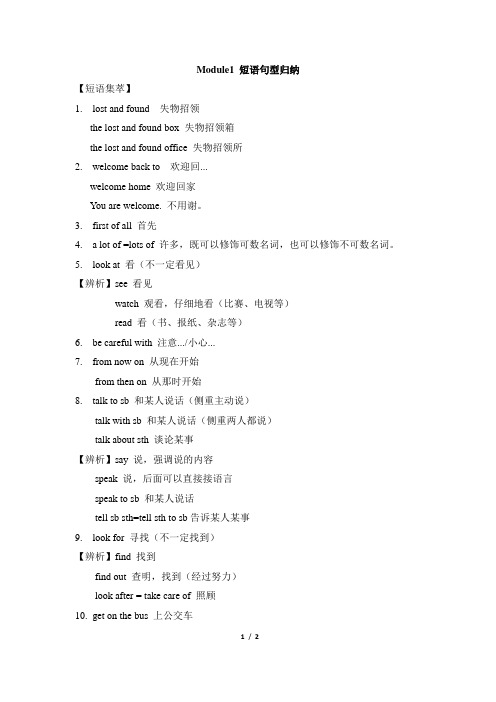
Module1 短语句型归纳【短语集萃】1.lost and found 失物招领the lost and found box 失物招领箱the lost and found office 失物招领所2.welcome back to 欢迎回...welcome home 欢迎回家You are welcome. 不用谢。
3.first of all 首先4. a lot of =lots of 许多,既可以修饰可数名词,也可以修饰不可数名词。
5.look at 看(不一定看见)【辨析】see 看见watch 观看,仔细地看(比赛、电视等)read 看(书、报纸、杂志等)6.be careful with 注意.../小心...7.from now on 从现在开始from then on 从那时开始8.talk to sb 和某人说话(侧重主动说)talk with sb 和某人说话(侧重两人都说)talk about sth 谈论某事【辨析】say 说,强调说的内容speak 说,后面可以直接接语言speak to sb 和某人说话tell sb sth=tell sth to sb告诉某人某事9.look for 寻找(不一定找到)【辨析】find 找到find out 查明,找到(经过努力)look after = take care of 照顾10.get on the bus 上公交车get off the bus 下公交车11.in a hurry 匆忙地hurry up = come on 快点儿hurry to do sth 匆忙做某事12.hundreds of 成百上千的13.every day 每天everyday 每天的(形容词,后面接名词)14. at the moment = at this moment 此时此刻,现在at that moment = then 在那时15. such as 例如,后面不加逗号for example 例如,后面加逗号16. 帮助某人做某事help sb. (to) do sth.help sb. with sth.17. mobile phone移动电话,手机【典句必背】1. Welcome back to school, everyone!欢迎大家回到学校!2. First of all, come and look in the lost and found box! 首先,来失物招领箱看一看!3. Whose bag is this? 这是谁的包?4. Here’s a purple wallet! 这有一个紫色的钱包!5. They leave things on planes, on trains, on buses and in taxis.他们把东西忘在飞机、火车、公共汽车或出租车上。
初中英语外研版七年级下册M3U1预习指导(知识点+练习题)
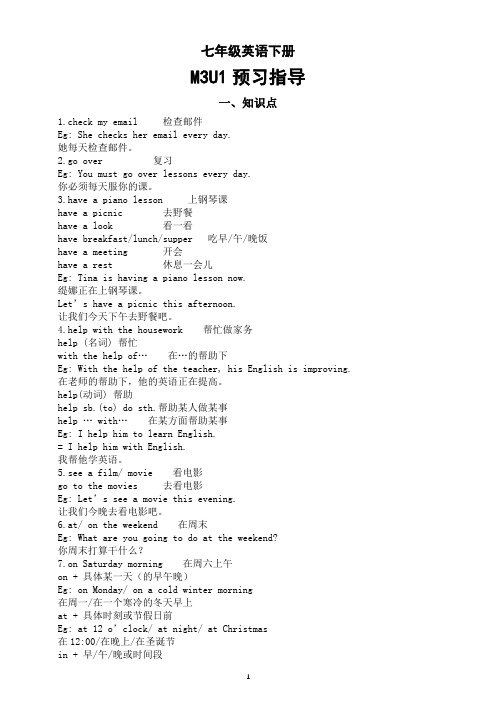
七年级英语下册M3U1预习指导一、知识点1.check my email 检查邮件Eg: She checks her email every day.她每天检查邮件。
2.go over 复习Eg: You must go over lessons every day.你必须每天服你的课。
3.have a piano lesson 上钢琴课have a picnic 去野餐have a look 看一看have breakfast/lunch/supper 吃早/午/晚饭have a meeting 开会have a rest 休息一会儿Eg: Tina is having a piano lesson now.缇娜正在上钢琴课。
Let’s have a picnic this afternoon.让我们今天下午去野餐吧。
4.help with the housework 帮忙做家务help (名词) 帮忙with the help of…在…的帮助下Eg: With the help of the teacher, his English is improving. 在老师的帮助下,他的英语正在提高。
help(动词) 帮助help sb.(to) do sth.帮助某人做某事help … with…在某方面帮助某事Eg: I help him to learn English.= I help him with English.我帮他学英语。
5.see a film/ movie 看电影go to the movies 去看电影Eg: Let’s see a movie this evening.让我们今晚去看电影吧。
6.at/ on the weekend 在周末Eg: What are you going to do at the weekend?你周末打算干什么?7.on Saturday morning 在周六上午on + 具体某一天(的早午晚)Eg: on Monday/ on a cold winter morning在周一/在一个寒冷的冬天早上at + 具体时刻或节假日前Eg: at 12 o’clock/ at night/ at Christmas在12:00/在晚上/在圣诞节in + 早/午/晚或时间段Eg: in the morning/ in two years在早上/在两年后8.what else 还有什么who else 还有谁else(形容词)“别的;其他的”位于疑问词或不定代词之后Eg: Nothing else happens.没有其他的事发生。
【早读必备】七年级英语外研版下册Module1_重点单词短语句子
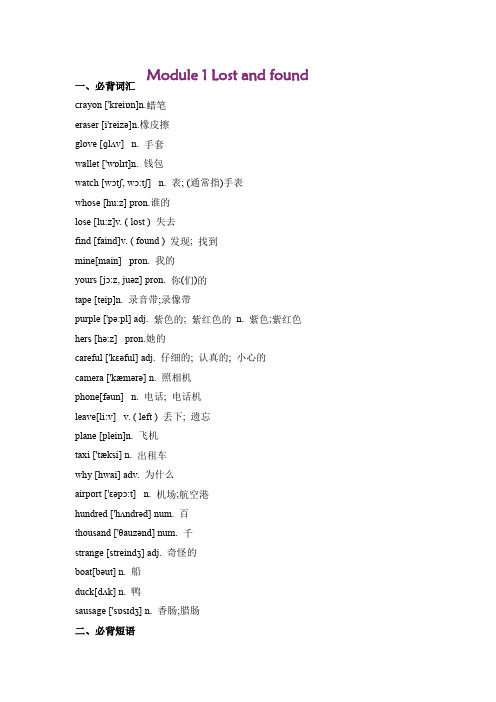
Module 1 Lost and found 一、必背词汇crayon ['kreiɒn]n.蜡笔eraser [i'reizə]n.橡皮擦glove [ɡlʌv]n. 手套wallet ['wɒlɪt]n. 钱包watch [wɔtʃ, wɔ:tʃ]n. 表; (通常指)手表whose [hu:z] pron.谁的lose [lu:z]v. ( lost ) 失去find [faind]v. ( found ) 发现; 找到mine[main]pron. 我的yours [jɔ:z, juəz] pron. 你(们)的tape [teip]n. 录音带;录像带purple ['pə:pl] adj. 紫色的; 紫红色的n. 紫色;紫红色hers [hə:z]pron.她的careful ['kεəful] adj. 仔细的; 认真的; 小心的camera ['kæmərə] n. 照相机phone[fəun]n. 电话; 电话机leave[li:v]v. ( left ) 丢下; 遗忘plane [plein]n. 飞机taxi ['tæksi] n. 出租车why [hwai] adv. 为什么airport ['εəpɔ:t]n. 机场;航空港hundred ['hʌndrəd] num. 百thousand ['θauzənd] num. 千strange [streindʒ] adj. 奇怪的boat[bəut] n. 船duck[dʌk] n. 鸭sausage ['sɒsɪdʒ] n. 香肠;腊肠二、必背短语1. first of all首先2. lost and found box失物招领箱3. be careful with对……小心4. from now on从现在起5. mobile phone移动电话6. lost and found office失物招领办公室7. in a hurry匆忙地8. hundreds of成百上千的9. look for寻找10. such as比如11. help sb. do sth.帮助某人做某事三、经典句型1. ---Whose bag is this?---Oh, sorry! It’s mine.——这是谁的包?——哦,抱歉!是我的。
初中英语外研版七年下三模块1 M3U1词组复习和语法讲解
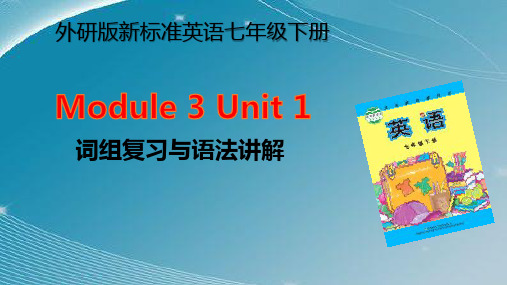
主语+ be + going to do
如:I'm going to check my email this evening.
2. 常见的表示将来的时间短语: this afternoon / evening, tonight tomorrow (morning / afternoon / evening) the day after tomorrow next Sunday / week / month / year 等等
M3U1 词组复习与语法讲解
Please translate the phrases into English.
1. 在周末
at the weekend
2. 复习功课
go over lessons
3. 帮助做家务
help with the housework
4. 看电影 5. 检查我的电子邮件
see a movie check my email
6. 有/上一节钢琴课
have a piano lesson
7. 去野餐
Hale Waihona Puke have a picnic
8. 在星期六的早晨
on Saturday morning
9. 在公园见面
meet in the park
10. 独自待在家中
stay at home alone
一般将来时:be going to
1. 如果想表达自己打算做某事、计划做某事或者有意 做某事,我们可以用be going to 的结构:
3.be going to do sth. 的否定形式和疑问形式(教材94页)
4.句型转换
肯定句:He is going to get up early on Saturday morning. 否定句:He isn’t going to get up early on Saturday morning. 疑问句:Is he going to get up early on Saturday morning? 肯定回答:Yes, he is. 否定回答:No, he isn’t.
外研版-▏七年级下册英语重点知识点汇总
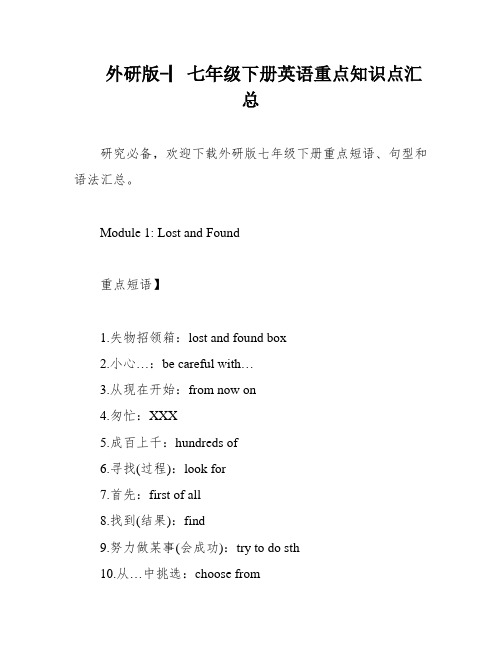
外研版-▏七年级下册英语重点知识点汇总研究必备,欢迎下载外研版七年级下册重点短语、句型和语法汇总。
Module 1: Lost and Found重点短语】1.失物招领箱:lost and found box2.小心…:be careful with…3.从现在开始:from now on4.匆忙:XXX5.成百上千:hundreds of6.寻找(过程):look for7.首先:first of all8.找到(结果):find9.努力做某事(会成功):try to do sth10.从…中挑选:choose from11.试图做某事(成功与否未知):XXX12.此时此刻:XXX13.例如(用于列举):such as14.例如:for example重点句型】1.这是谁的 (XXX)2.帮助某人做某事:help sb do sth3.请小心保管…:XXX…语法总结】物主代词:表示所属关系的代词(…属于谁的) 单数:人称形容词性物主代词名词性物主代词第一人称 my XXX第二人称 your yours第三人称 his/hers/its his/hers/its复数:人称形容词性物主代词名词性物主代词第一人称 our ours第二人称 your yours第三人称 their theirs形容词性物主代词必须和名词在一起,例如XXX。
XXX。
名词性物主代词相当于与之相对应的形容词性物主代词+名词,例如XXX.Module 2: What Can You Do?重点短语】1.与某人相处融洽:get on well with sb.2.弹钢琴:play the piano3.打乒乓球:play table XXX4.怎么样?= …怎么样。
what about…?=how about…?5.担心…:XXX…6.擅长做某事:be good at doing sthFly a kite is a fun activity that people of all ages can enjoy。
- 1、下载文档前请自行甄别文档内容的完整性,平台不提供额外的编辑、内容补充、找答案等附加服务。
- 2、"仅部分预览"的文档,不可在线预览部分如存在完整性等问题,可反馈申请退款(可完整预览的文档不适用该条件!)。
- 3、如文档侵犯您的权益,请联系客服反馈,我们会尽快为您处理(人工客服工作时间:9:00-18:30)。
七年级下册M3U1单词、短语和重点句子
单词:go over复习; 练习picnic n. 野餐housework n. 家务劳动
on prep. 在……时候else adv. 其他; 另外nobody pron. 没有人
at prep. 在……点钟nothing pron. 没有什么; 没有东西silly adj. 愚蠢的; 傻气的fantastic adj. 极好的
短语:go over lessons 复习功课check my email 查收我的邮件have a picnic 去野餐see a movie 看电影
help with the housework 帮忙做家务have a piano lesson 上钢琴课on Saturday morning 在周六上午do one’s homework 做某人的家庭作业stay at home alone 独自待在家里
重点句子:
1.What are you going to do at the weekend? 你周末打算做什么?
2.On Saturday morning, I’m going to check my email and do my homework.
在周六早晨,我打算查看我的电子邮件、写作业。
3.Then I’m going to help with the housework.然后帮忙做家务。
4.I’m going to see a movie in the afternoon.我打算下午去看电影。
5.Who else is going to be there?还有谁去那儿?
6.Lingling is going to have a piano lesson.玲玲打算去上钢琴课。
7.On Sunday afternoon, Lingling and I are going to have a picnic.
周日下午,玲玲和我要去野餐。
8.Would you like to join us?你想加入我们吗?-Yes, I’d love to是的,我想。
9.Are we going to meet here?我们将在这儿见面吗?-No, we aren’t. 不,不是。
10.We are going to meet in the park at one o’clock.我们打算1点钟在公园里见面。
11.What are your plans for the weekend?你周末有什么计划吗?
12.I’m going to stay at home alone.我打算一个人待在家里。
13.Don’t be silly!别傻了!
14.It’s going to be a fantastic weekend!这将会是一个精彩的周末。
